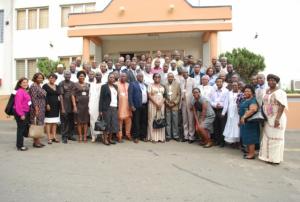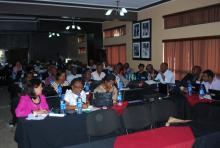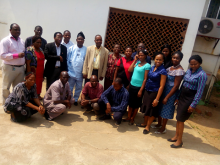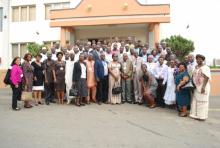WHO supports Nigerian government in efforts to eradicate polio in 2015
Ibadan, Oyo Nigeria 5 February, 2015 – To sustain interruption of wild poliovirus transmission in Nigeria, the World Health Organization’s Immunization, Vaccines and Emergencies (IVE) Cluster conducted a weeklong review and planning meeting in Ibadan, Oyo from 2 to 6 February 2015.
The six geo-political zones reviewed their performances in 2014, developed zonal and state work plans for 2015, strengthened routine immunization activities, enhanced surveillance systems, and solidified the accountability framework to ensure prudent management of resources.
In Nigeria, the transmission of wild poliovirus has never been interrupted but the country has not reported a case in over 6 months. This is an unprecedented achievement but the country cannot become complacent as polio was once endemic and previously exported cases to other countries in the African Region.
"The IVE cluster has a unique opportunity to support the government of Nigeria to migrate from the classification of polio endemic countries based on the gains of 2014, stopping all poliovirus transmissions by April 2015, and sustain these achievements in 2015 and beyond,” said Dr Pascal Mkanda, IVE Cluster leader.
To help detect and confirm any new cases of polio, integrating polio laboratories and strengthening surveillance systems are critical components in eradication efforts. In response, Dr Mkanda led a team from the country office to the University of Ibadan – one of the two national polio laboratories in Nigeria – that forms part of the network of the global WHO accredited laboratories.
“In the next 6 months, we must show evidence that there is no poliovirus case in humans and the environment,” said Dr Mkanda. This underscores the importance of integrating polio laboratories and surveillance systems in order to sustain efforts by all stakeholders, include the Global Polio Eradication Initiative.
Dr Johnson Adeniji, Director of Ibadan Polio Laboratory assured the team of the strict adherence to the containment procedures that have been established at the laboratory and stated “all work involving stool handling in the lab is carried out inside the biosafety cabinet II which ensures that both the worker and the environment are properly protected.”
In efforts to sustain polio eradication efforts, WHO will continue to provide technical, financial and logistical support to assist various domains of laboratory works and conduct annual accreditation exercises.
_______________________________________
01. Participants at the Meeting
02. Ibadan group picture
03. Dr. Pascal Mkanda (middle) with Laboratory staff in Ibadan






